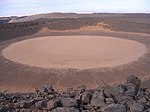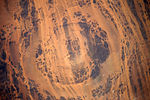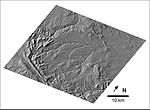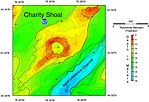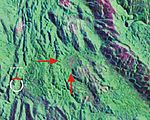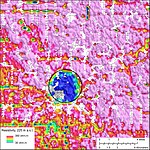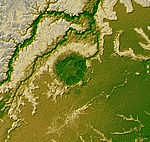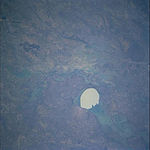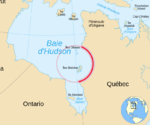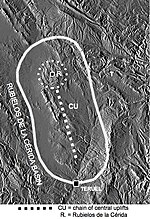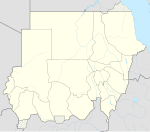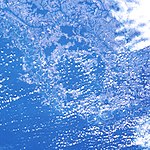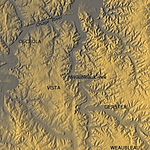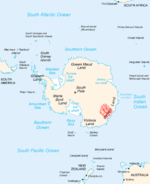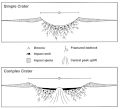| Some of this article's listed sources may not be reliable. Please help improve this article by looking for better, more reliable sources. Unreliable citations may be challenged and removed. (January 2023) (Learn how and when to remove this message) |
Download coordinates as:
According to the Planetary and Space Science Centre (PASSC) at the University of New Brunswick in Canada, there are 190 confirmed impact structures on Earth. Each is recorded in a database called the Earth Impact Database (EID).
List of confirmed and possible impact structures
The following tables list geological features on Earth that are known impact events as well as possible, but for which there is currently no confirming scientific evidence in the peer-reviewed literature, impact events. In order for a structure to be confirmed as an impact crater, it must meet a stringent set of well-established criteria. Some proposed impact structures are likely to eventually be confirmed, whereas others are likely to be shown to have been misidentified (see below). Recent extensive surveys have been done for Australian (2005), African (2014), and South American (2015) craters, as well as those in the Arab world (2016). A book review by A. Crósta and U. Reimold disputes some of the evidence presented for several of the South American structures.
Overview
Russia's Lake Cheko is thought by one research group to be the result of the famous Tunguska event, although sediments in the lake have been dated back more than 5,000 years. There is highly speculative conjecture about the supposed Sirente impact (c. 320 ± 90 AD) having caused the Roman emperor Constantine's vision at Milvian Bridge.
The Burckle crater and Umm al Binni structure are proposed to be behind the floods that affected Sumerian civilization. The Kachchh impact may have been witnessed by the Harappan civilization and mentioned as a fireball in Sanskrit texts.
Shortly after the Hiawatha Crater was discovered, researchers suggested that the impact could have occurred as late as ~12,800 years ago, leading some to associate it with the controversial Younger Dryas impact hypothesis (YDIH). James Kennett, a leading advocate of the YDIH said, "I'd unequivocally predict that this crater is the same age as the Younger Dryas."
These claims were criticised by other scholars. According to impact physicist Mark Boslough writing for Skeptical Inquirer the first reports of the impact released by science journalist Paul Voosen focused on this being a young crater which according to Boslough "set the tone for virtually all the media reporting to follow". Boslough argued, based on evidence and statistical probability, that once the crater has been drilled and researched "it will turn out to be much older." He complained that this important discovery "was tainted by connections to a widely discredited hypothesis and speculations that did not make it through peer review". The YDIH has since been refuted comprehensively by a team of earth scientists and impact experts.
A 2022 study using Argon–Argon dating of shocked zircon crystals in impact melt rocks found outwash less than 10 km downstream of the glacier pushed the estimate back to around 57.99 ± 0.54 million years ago, during the late Paleocene. Confirmation would require drilling almost one km (3,300 ft) through the ice sheet above the crater to obtain a sample of dateable, solidified impact melt from the crater.
The age of the Bloody Creek crater is uncertain.
As the trend in the Earth Impact Database for about 26 confirmed craters younger than a million years old shows that almost all are less than two km (1.2 mi) in diameter (except the three km (1.9 mi) Agoudal and four km (2.5 mi) Rio Cuarto), the suggestion that two large craters, Mahuika (20 km (12 mi)) and Burckle (30 km (19 mi)), formed only within the last few millennia has been met with skepticism. However, the source of the young (less than a million years old) and enormous Australasian strewnfield (c. 790 ka) is suggested to be a crater about 100 km (62 mi) across somewhere in Indochina, with Hartung and Koeberl (1994) proposing the elongated 100 km × 35 km (62 mi × 22 mi) Tonlé Sap lake in Cambodia (visible in the map at the side) as a suspect structure.
The Decorah crater has been conjectured as being part of the Ordovician meteor event.
Several twin impacts have been proposed, such as the Rubielos de la Cérida and Azuara (30–40 Ma), Cerro Jarau and Piratininga (c. 117 Ma), and Warburton East and West (300–360 Ma). However, adjacent craters may not necessarily have formed at the same time, as demonstrated by the case of the confirmed Clearwater East and West lakes.
Some confirmed impacts like Sudbury or Chicxulub are also sources of magnetic anomalies and/or gravity anomalies. The magnetic anomalies Bangui and Jackpine Creek, the gravity anomalies Wilkes Land crater and Falkland Islands, and others have been considered as being of impact origin. Bangui apparently has been discredited, but appears again in a 2014 table of unconfirmed structures in Africa by Reimold and Koeberl.
Several anomalies in Williston Basin were identified by Swatzky in the 1970s as astroblemes including Viewfield, Red Wing Creek, Eagle Butte, Dumas, and Hartney, of which only the last two are unconfirmed.
The Eltanin impact has been confirmed (via an iridium anomaly and meteoritic material from ocean cores) but, as it fell into the Pacific Ocean, apparently no crater was formed. The age of Silverpit and the confirmed Boltysh crater (65.17 ± 0.64 Ma), as well as their latitude, has led to the speculative hypothesis that there may have been several impacts during the KT boundary. Of the five oceans in descending order by area, namely the Pacific, Atlantic, Indian, Antarctic, and Arctic, only the smallest (the Arctic) does not yet have a proposed unconfirmed impact crater.
Craters larger than 100 kilometres (62 mi) in the Phanerozoic (after 541 Ma) are notable for their size as well as for the possible coeval events associated with them especially the major extinction events.
For example, the Ishim impact structure is conjectured to be bounded by the late Ordovician-early Silurian (c. 445 ± 5 Ma), the two Warburton basins have been linked to the Late Devonian extinction (c. 360 Ma), both Bedout and the Wilkes Land crater have been associated with the severe Permian–Triassic extinction event (c. 252 Ma), Manicouagan (c. 215 Ma) was once thought to be connected to the Triassic–Jurassic extinction event (c. 201 Ma) but more recent dating has made it unlikely, while the consensus is the Chicxulub impact caused the one for Cretaceous–Paleogene (c. 66 Ma).
However, other extinction theories employ coeval periods of massive volcanism such as the Siberian Traps (Permian-Triassic) and Deccan Traps (Cretaceous-Paleogene).
Undiscovered but inferred
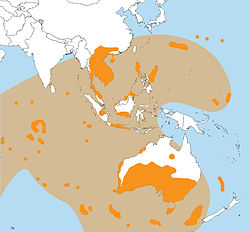
There is geological evidence for impact events having taken place on Earth on certain specific occasions, which should have formed craters, but for which no impact craters have been found. In some cases this is because of erosion and Earth's crust having been recycled through plate tectonics, in others likely because exploration of the Earth's surface is incomplete, or because no actual crater was formed because the impacting object exploded as a cosmic air burst. Typically the ages are already known and the diameters can be estimated.
| Parent crater of | Expected crater diameter | Age | Notes |
|---|---|---|---|
| Pica glass | Unknown | 12 ka | |
| Libyan desert glass | Unknown | 29 Ma | |
| Dakhleh glass | 0.4 km | 150 ka | |
| Argentinian impact glasses | Unknown | 6, 114, and 445 ka;
5.3 and 9.2 Ma |
|
| Australasian tektites | 32–114 km | 780 ka | |
| Central American tektites | 14 km | 820 ka | |
| Skye ejecta deposits | Unknown | 60 Ma | |
| Stac Fada Member | 40 km | 1.2 Ga | |
| Barberton Greenstone Belt spherules | 500 km | 3.2 Ga | |
| Marble Bar impact spherules | "hundreds of kilometers" | 3.4 Ga | |
| Kaveri Crater | 120 km | 800 to 550 million years ago |
Mistaken identity
Some geological processes can result in circular or near-circular features that may be mistaken for impact craters. Some examples are calderas, maars, sinkholes, glacial cirques, igneous intrusions, ring dikes, salt domes, geologic domes, ventifacts, tuff rings, forest rings, and others. Conversely, an impact crater may originally be thought as one of these geological features, like Meteor Crater (as a maar) or Upheaval Dome (as a salt dome).
The presence of shock metamorphism and shatter cones are important criteria in favor of an impact interpretation, though massive landslides (such as the Köfels landslide of 7800 BC which was once thought to be impact-related) may produce shock-like fused rocks called "frictionite".
-
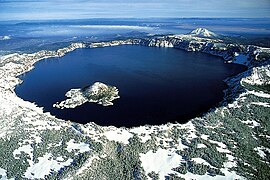 Crater Lake, Oregon (a caldera)
Crater Lake, Oregon (a caldera)
-
 Three maars in Germany
Three maars in Germany
-
 Great Blue Hole, Belize (a sinkhole)
Great Blue Hole, Belize (a sinkhole)
-
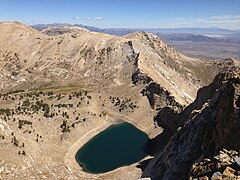 Verdi Lake (a glacial cirque)
Verdi Lake (a glacial cirque)
-
 Kondyor Massif or Konder (an igneous intrusion)
Kondyor Massif or Konder (an igneous intrusion)
-
 Salt domes on Melville Island
Salt domes on Melville Island
-
 The Richat structure (a geologic dome)
The Richat structure (a geologic dome)
-
 The Arkenu structures (a pair of ring dikes)
The Arkenu structures (a pair of ring dikes)
-
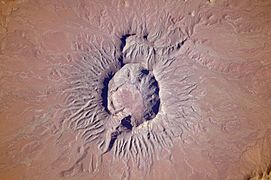 Brukkaros Mountain (a tuff ring)
Brukkaros Mountain (a tuff ring)
-
 A forest ring in Ontario
A forest ring in Ontario
See also
- Earth Impact Database
- Gliese 710 – example of gravitational perturbations (in mega-year scale) of the Solar System
- Impact Field Studies Group
- Impact craters
- Impact events
- List of impact craters on Earth
- Meteor air burst
- Tollmann's bolide hypothesis
- Traces of Catastrophe, 1998 book from Lunar and Planetary Institute – comprehensive reference on impact crater science
Notes and references
Notes
References
- updated, Daisy Dobrijevic last (2021-10-29). "10 Earth impact craters you must see". Space.com. Retrieved 2023-02-05.
- ^ Haines, P. W. (2005). "Impact cratering and distal ejecta: The Australian record". Australian Journal of Earth Sciences. 52 (4–5): 481–507. Bibcode:2005AuJES..52..481H. doi:10.1080/08120090500170351. S2CID 128705406.
- ^ Reimold, Wolf Uwe; Koeberl, Christian (2014). "Impact structures in Africa: A review". Journal of African Earth Sciences. 93: 57–175. Bibcode:2014JAfES..93...57R. doi:10.1016/j.jafrearsci.2014.01.008. PMC 4802546. PMID 27065753.
- Acevedo, R.; Rocca, M. C.; Ponce, J.; Stinco, S. (2015). Impact Craters in South America. SpringerBriefs in Earth Sciences. Springer. ISBN 978-3-319-13092-7.
- Chabou, M. C. (2016). "An updated inventory of meteorite impact structures in the Arab world". 1st ArabGU International Conference, Feb 2016, Algeria.
- Crósta, Alvaro P.; Reimold, Wolf Uwe (2016). "Impact Craters in South America, by Acevedo R. D., Rocca M. C. L., Ponce J. F., and Stinco S. G. Heidelberg: Springer, 2015. 104 p. SpringerBriefs in Earth Sciences: South America and the Southern Hemisphere. ISBN 978-3-319-13092-7". Meteoritics & Planetary Science. 51 (5): 996–999. doi:10.1111/maps.12632.
- Rampino, M.R; Volk, T. (1996). "Multiple impact event in the Paleozoic: Collision with a string of comets or asteroids?" (PDF). Geophysical Research Letters. 23 (1): 49–52. Bibcode:1996GeoRL..23...49R. doi:10.1029/95GL03605. Retrieved 2019-04-06.
- "Acraman". www.passc.net. Retrieved 2023-02-05.
- ^ Expert Database on Earth Impact Structures (EDEIS), Accessed May 2016
- Murgab
- "Meteorite crater site of Ak-Bura". Archived from the original on 2016-06-05. Retrieved 2016-05-12.
- Bacharev, A (1952), The Murgab meteorite crater. Astron. Tsirk., No 122, pp. 8–10
- Al Madafi
- Garvin, James B.; Blodget, Herbert W. (1986). "Suspected Impact Crater Near Al Madafi, Saudi Arabia". Meteoritics. 21: 366. Bibcode:1986Metic..21..366G.
- Roger Weller. Al Madafi crater Archived 2016-09-17 at the Wayback Machine
- Warme, J.E.; Sandberg, C.A. (1996). "Alamo megabreccia: record of a Late Devonian impact in southern Nevada" (PDF). GSA Today. 6 (1): 1–7.
- Morrow, JR; Sandberg, CA; Malkowski, K; Joachimski, MM (2009). "Carbon isotope chemostratigraphy and precise dating of middle Frasnian (lower Upper Devonian) Alamo Breccia, Nevada, USA". Palaeogeography, Palaeoclimatology, Palaeoecology. 282 (1–4): 105–118. Bibcode:2009PPP...282..105M. doi:10.1016/j.palaeo.2009.08.016.
- Mikheeva, 2017.
- List of confirmed impact craters by name - Earth Impact Database
- Anefis
- ^ A. Rossi (2002). Seven Possible New Impact Structures In Western Africa Detected On Aster Imagery, Lunar and Planetary Science XXXIII
- Roger Weller Anefis crater Archived 2016-09-17 at the Wayback Machine
- Aorounga
- Ocampo, A. C.; Pope, K. O. (1996). "Shuttle Imaging Radar (SIR-C) Images Reveal Multiple Impact Craters at Aorounga, Northern Chad". Lunar and Planetary Science. 27: 977. Bibcode:1996LPI....27..977O.
- ^ S. Master & W. Reimold (2000). The impact cratering record of Africa: An updated inventory of proven, probable, possible, and discredited impact structures on the African continent, Catastrophic Events Conference 2000.
- Arganaty
- Zeilik, B. S. (1987). "The Arganaty cosmogenic crater in southern Kazakhstan and the ring structures associated with it". Akademiia Nauk SSSR, Doklady. 297 (4): 925–928. Bibcode:1987DoSSR.297..925Z.
- Barash, M. (2012). "Mass Extinction of Ocean Organisms at the Paleozoic–Mesozoic Boundary: Effects and Causes". Oceanology. 52 (2): 238–248. Bibcode:2012Ocgy...52..238B. doi:10.1134/s000143701201002x. S2CID 129822484.
- Unnamed ("Arlit")
- David Rajmon (2010). Impact Field Studies Group
- Marc Fokker (2008). Astroforum Netherlands Archived 2015-04-02 at the Wayback Machine
- "Avak". www.passc.net. Retrieved 2023-02-05.
- Azuara
- Bajada del Diablo
- R. D. Acevedo, J. Rabassa, M. J. Orgeira, et al. (2010) Bajada Del Diablo Impact Crater Strewn-Field, Patagonia, Argentina: The Largest Crater Field In The World? 73rd Annual Meteoritical Society Meeting
- Acevedo, R.D.; Rabassa, J.; Ponce, J.F.; Martínez, O.; Orgeira, M.J.; Prezzi, C.; Corbella, H.; González-Guillot, M.; Rocca, M.; Subías, I.; Vásquez, C. (2012). "The Bajada del Diablo astrobleme-strewn field, central Patagonia Argentina: Extending the exploration to surrounding areas". Geomorphology. 169–170: 151–164. Bibcode:2012Geomo.169..151A. doi:10.1016/j.geomorph.2012.04.020.
- Bajo Hondo
- M. C. Rocca (2005). BAJO HONDO, CHUBUT, PATAGONIA, ARGENTINA: A NEW METEORITE IMPACT CRATER IN BASALT?, 68th Annual Meteoritical Society Meeting
- Bangui
- Girdler, R.; Taylor, P.; Frawley, J. (1992). "A possible impact origin for the Bangui magnetic anomaly (Central Africa)". Tectonophysics. 212 (1): 45–58. Bibcode:1992Tectp.212...45G. doi:10.1016/0040-1951(92)90139-w.
- "Barringer Meteor Crater and Its Environmental Effects". www.lpi.usra.edu. Retrieved 2023-02-05.
- Bateke
- S. Master, G.R.J. Cooper and K. Klajnik (2013). The Bateke Plateau Structure – A New Possible 7 Km Diameter Quaternary Meteorite Impact Structure In Gabon: A Remote Sensing Study, 13th SAGA Biennial Conference & Exhibition
- Bedout
- Becker, L.; Poreda, R. J.; Basu, A. R.; Pope, K. O.; Harrison, T. M.; Nicholson, C.; Iasky, R. (2004). "Bedout: A Possible End-Permian Impact Crater Offshore of Northwestern Australia". Science. 304 (5676): 1469–1476. Bibcode:2004Sci...304.1469B. doi:10.1126/science.1093925. PMID 15143216. S2CID 17927307.
- Bee Bluff
- R. A. Graham (2005) Reinvestigation of the Bee Bluff Structure South of Uvalde, Texas, 'The Uvalde Crater'. Lunar and Planetary Science XXXVI (2005)
- Bee Bluff
- Björkö
- H. Henkel, A. Bäckström, B. Bergman, O. Stephansson, and M. Lindström (2005). Geothermal Energy from Impact Craters? The Björkö Study, Proceedings World Geothermal Congress 2005
- Bloody Creek
- Bohemia
- Papagiannis, Michael D. (1989). "Photographs from geostationary satellites indicate the possible existence of a huge 300 KM impact crater in the Bohemian region of Czechoslovakia". Meteoritics. 24: 313. Bibcode:1989Metic..24R.313P.
- Rajlich, P. (1992). "Bohemian Circular Structure, Czechoslovakia: Search for the Impact Evidence". Abstracts of Papers Presented to the International Conference on Large Meteorite Impacts and Planetary Evolution. Held August 31 – September 2, 1992, in Sudbury, Ontario, Canada. Vol. 790. Lunar and Planetary Institute. p. 57. Bibcode:1992LPICo.790...57R. LPI Contribution 790.
{{cite book}}:|journal=ignored (help) - Bow City
- Bowers
- ^ L. P. Hrjanina (Khryanina), 2006. "Once again about Kainozoic meteorite structures in the Ross Sea, Antarctica" (PDF).
{{cite web}}: CS1 maint: numeric names: authors list (link) - Gerard-Little, P.; Abbott, D.; Breger, D.; Burckle, L (2006). "Evidence for a Possible Late Pliocene Impact in the Ross Sea, Antarctica".
- Paul Rincon (2006). Space impact clue in Antarctica, BBC News
- Heinrich, P.V. (2003) Possible Meteorite Impact Crater in St. Helena Parish, Louisiana Search and Discovery Article. no. 50006. American Association of Petroleum Geologist, Tulsa, Oklahoma. Retrieved March 27, 2011.
- King, D.T., Jr., and Petruny, L.W.. 2007. Impact structures and craters of the U.S. Gulf coastal states. Gulf Coast Association of Geological Societies Transactions. v. 57, p. 409-425.
- Matherne, C., Karunatillake, S., Hood, D.R., Duxbury, J., Herr, A., Heinrich, P., Horn, M., Webb, A. and Sivils, A., 2020. Planar Deformation Features Found Within a Possible Impact Structure, the Brushy Creek Feature, St. Helena Parish, LA. Lunar and Planetary Science Conference No. 2326, p. 2361.
- Herr, Andrew. "Investigating the Brushy Creek Impact Crater" (PDF). Houston lunar and planetary science conference.
- Quek, Long Xiang; Ghani, A. A; Badruldin, Muhammad Hafifi; Mokhtar, Saidin; Harith, Zuhar Zahir; Roselee, M. Hatta (2015). "Platinum Group Elements in Proximal Impactites of the Bukit Bunuh Impact Structure, Malaysia". Current Science. 109 (12): 2303. doi:10.18520/v109/i12/2303-2308 (inactive 1 November 2024).
{{cite journal}}: CS1 maint: DOI inactive as of November 2024 (link) - Jinmin, Mark; Saad, Rosli; Nordiana, M.M.; Mokhtar, Saidin (2017). "Trilogy possible meteorite impact crater at Bukit Bunuh, Malaysia using 2-D electrical resistivity imaging". AIP Conference Proceedings. 1861 (1): 030012. Bibcode:2017AIPC.1861c0012J. doi:10.1063/1.4990899.
- Burckle
- ^ Abbott, Dallas H., Martos, Suzanne, Elkinton, Hannah, Bryant, Edward F., Gusiakov, Viacheslav, and Breger, Dee (2006). Impact craters as sources of megatsunami generated chevron dunes. 2006 Philadelphia Annual Meeting (22–25 October 2006)
- Masse W. B., Bryant E., Gusiakov V., Abbott D., Rambolamanana G., Raza H., Courty M.A. (2006). Holocene Indian ocean cosmic impacts – the megatsunami chevron evidence from southern Madagascar. AGU, San Francisco
- Catalina
- Legg, Mark R.; Nicholson, Craig; Goldfinger, Chris; Milstein, Randall; Kamerling, Marc (2004). "Large enigmatic crater structures offshore southern California". Geophys. J. Int. 159 (2): 803–815. Bibcode:2004GeoJI.159..803L. doi:10.1111/j.1365-246x.2004.02424.x.
- Brandsma Dan, Lund Steve P.; Henyey Thomas, L. (1989). "Paleomagnetism of Late Quaternary marine sediments from Santa Catalina basin, California continental borderland ". J. Geophys. Res. B. 94 (1): 547–564. Bibcode:1989JGR....94..547B. doi:10.1029/JB094iB01p00547.
- Jarau
- ^ A. Crósta, R. Romano (2004). Brazilian Impact Craters: A Review, 35th Lunar and Planetary Science Conference
- ^ A. Crósta, M. Vasconcelos (2013). Update On The Current Knowledge Of The Brazilian Impact Craters, 44th Lunar and Planetary Science Conference
- Charity Shoal
- Holcombe, Troy L.; Warren, John S.; Reid, David F.; Virden, William T.; Divins, David L. (2001). "Small Rimmed Depression in Lake Ontario: An Impact Crater?". Journal of Great Lakes Research. 27 (4): 510–517. Bibcode:2001JGLR...27..510H. doi:10.1016/S0380-1330(01)70664-8.
- Holcombe, Troy L.; Youngblut, Scott; Slowey, Niall (2013). "Geological structure of Charity Shoal crater, Lake Ontario, revealed by multibeam bathymetry". Geo-Marine Letters. 33 (4): 245–252. Bibcode:2013GML....33..245H. doi:10.1007/s00367-013-0322-6. S2CID 129846298.
- Suttak, P.A., 2013, High-resolution lake-based magnetic mapping and modeling of basement structures, with examples from Küçükçekmece Lagoon, Turkey and Charity Shoal, Lake Ontario. unpublished MS thesis, School of Geography and Earth Sciences, McMaster University, Hamilton, Ontario. 113 pp.
- Assis Fernandes V., Hopp J., Schwarz W.H., Fritz J.P., and Trieloff M. (2019) 40Ar-39Ar step heating of North American tektites and of impact melt rock samples from the Chesapeake Bay impact structure. Geochimica et Cosmochimica Acta 255, 289-308. https://doi.org/10.1016/j.gca.2019.03.004
- "Clearwater East". www.passc.net. Retrieved 2023-02-06.
- Corossol
- Higgins, M.D., P. Lajeunesse, G. St-Onge, R. Sanfacon, and M. Duchesne, 2013, Impact Breccia Clast from the Corossol Crater, Canada. 76th Annual Meteoritical Society Meeting. Meteoritics and Planetary Science Supplement. id.5190.
- Lajeunesse, Patrick; St-Onge, Guillaume; Locat, Jacques; Duchesne, Mathieu J.; Higgins, Michael D.; Sanfaçon, Richard; Ortiz, Joseph (2013). "The Corossol structure: A possible impact crater on the seafloor of the northwestern Gulf of St. Lawrence, Eastern Canada". Meteoritics & Planetary Science. 48 (12): 2542–2558. Bibcode:2013M&PS...48.2542L. doi:10.1111/maps.12224. S2CID 140639070.
- Lajeunesse, P., Duchesne, M.J., St-Onge, G., Locat, J., Higgins, M., Sanfaçon, R. and Ortiz, J., 2016. The Corossol Structure: a glaciated crater of possible impact origin in the northwestern Gulf of St Lawrence, eastern Canada. In Dowdeswell, J. A., Canals, M., Jakobsson, M., Todd, B. J., Dowdeswell, E. K. & Hogan, K. A. (eds) 2016. Atlas of Submarine Glacial Landforms: Modern, Quaternary and Ancient. Geological Society, London, Memoirs, 46(1), pp.127–128.
- Darwin
- Decorah
- Briggs, D.E.; Liu, H.P.; McKay, R.M.; Witzke, B.J. (2018). "The Winneshiek biota: exceptionally well-preserved fossils in a Middle Ordovician impact crater". Journal of the Geological Society. 175 (6): 865–874. Bibcode:2018JGSoc.175..865B. doi:10.1144/jgs2018-101. S2CID 85450625.
- French, B.M., McKay, R.M., Liu, H.P., Briggs, D.E. and Witzke, B.J., 2018. "The Decorah structure, northeastern Iowa: geology and evidence for formation by meteorite impact." Geological Society of America Bulletin, 130(11–12), pp. 2062–2086.
- "Potential asteroid impact identified in western Queensland". Geoscience Australia. 2015-03-17. Retrieved 26 June 2016.
- Glikson, A.; Korsch, R.J.; Milligan, P. (2016). "The Diamantina River ring feature, Winton region, western Queensland". Australian Journal of Earth Sciences. 63 (5): 1–11. Bibcode:2016AuJES..63..653G. doi:10.1080/08120099.2016.1220978. S2CID 132501378. Retrieved 2019-04-06.
- Dumas
- ^ Gubins, A. & Strangway, D. (1978). "Magnetic Fields Associated with a Probable Late Cretaceous Astrobleme at Dumas, Saskatchewan", Lunar and Planetary Science IX, pp. 433–435
- Duolun
- Wu Siben (1989). "Geologic feature of the Duolun impact crater". Lunar and Planetary Science Conference. 20: 1219. Bibcode:1989LPI....20.1219W.
- El-Baz
- El-Baz, F (1981). "Circular Feature Among Dunes of the Great Sand Sea, Egypt". Science. 213 (4506): 439–440. Bibcode:1981Sci...213..439E. doi:10.1126/science.213.4506.439. PMID 17760189.
- Eltanin
- Shuvalov V.V. (2006). Numerical modeling of the Eltanin impact: determination of projectile size and tsunami amplitude. 40 ESLAB Symposium: 1 International Conference on Impact Cratering in the Solar System, Noordwijk, 8–12 May 2006, Noordwijk: ESA, pp. 201-202
- Weiss, Robert; Lynett, Patrick; Wünnemann, Kai (2015). "The Eltanin impact and its tsunami along the coast of South America: Insights for potential deposits". Earth and Planetary Science Letters. 409: 175–181. Bibcode:2015E&PSL.409..175W. doi:10.1016/j.epsl.2014.10.050.
- Faya Basin
- M. Schmieder and E. Buchner (2010). The Faya Basin (Chad) revisited – structural insights from central peak morphology and potential Martian analogs, Nördlingen Ries Crater Workshop (2010).
- Rocca, Maximiliano C. L.; Presser, Jaime Leonardo Báez; (2015) "A possible new very large impact structure in Falkland Islands", Historia Natural, Tercera Series, Volumen 5(2)
- Rocca, Maximiliano C. L.; Rampino, Michael R.; Presser, Jaime Leonardo Báez (2017). "Geophysical evidence for a large impact structure on the Falkland Plateau". Terra Nova. 29 (4): 233–37. Bibcode:2017TeNov..29..233R. doi:10.1111/ter.12269. S2CID 134484465.
- Reimold, W.U.; Crósta, A.P.; Koeberl, C.; Hauser, N. (2017). "Comment on "Geophysical evidence for a large impact structure on the Falkland (Malvinas) Plateau"". Terra Nova. 29 (6): 409–410. Bibcode:2017TeNov..29..233R. doi:10.1111/ter.12284. S2CID 134482395.
- McCarthy, D.; Aldiss, Michael D.; Arsenikos, S.; Stone, P.; Richards, P. (2017). "Comment on "Geophysical evidence for a large impact structure on the Falkland (Malvinas) Plateau"" (PDF). Terra Nova. 29 (6): 411–415. Bibcode:2017TeNov..29..233R. doi:10.1111/ter.12285. S2CID 133781924.
- Acevedo, R. D.; Rocca, M. C. L.; Ponce, J.; Stinco, S. G. (2015). Impact Craters in South America. Springer. p. 23. ISBN 978-3-319-13093-4.
- Fried Egg
- Amos, J (2009) 'Fried Egg' may be impact crater BBC News.
- Garet El Lefet
- Roger Weller. Garet El Lefet crater Archived 2016-09-17 at the Wayback Machine
- ^ Classen, J. (1977). "Catalogue of 230 Certain, Probable, Possible, and Doubtful Impact Structures". Meteoritics. 12 (1): 61–78. Bibcode:1977Metic..12...61C. doi:10.1111/j.1945-5100.1977.tb00332.x.
- Tornabene, L.L., 2001 The Gatun Structure: A geological assessment of a newly recognized impact structure near Lake Gatun in the Republic de Panama. Master of Science thesis. University of South Florida, Tampa, Florida, USA.
- Heckadon-Moreno, S, 2013. Livio Tornabene y el meteorito de Gatun. Epocas. 28 (11):10–11.
- LeBlanc, J., 2021. Stratigraphic Lexicon: The Onshore Cenozoic Sedimentary Formations of The Republic of Panama. Biosis: Biological Systems, 2(1), pp.1-173.
- General San Martín
- ^ Harris, R. S.; Schultz, P. H.; Zárate, M. A. (2007) La Dulce Crater: Evidence For A 2.8 Km Impact Structure In The Eastern Pampas Of Argentina, 38th Lunar and Planetary Science Conference
- R. D. Acevedo, M. Rocca, J. Rabassa and J. F. Ponce Meteorite Impact Craters In South America: A Brief Review. 74th Annual Meteoritical Society Meeting (2011)
- Gnargoo
- Iasky, R. P.; Glikson, A. Y. (2005). "Gnargoo: A possible 75 km-diameter post-Early Permian – pre-Cretaceous buried impact structure, Carnarvon Basin, Western Australia". Australian Journal of Earth Sciences. 52 (4–5): 575–586. Bibcode:2005AuJES..52..575I. doi:10.1080/08120090500170377. S2CID 128814897.
- Monteiro, J. F. (1991). "The Guarda Circular Structure: A Possible Complex Impact Crater". Abstracts of the Lunar and Planetary Science Conference. 22: 915–916. Bibcode:1991LPI....22..915M.
- Van Zalinge, M. E. (2012). The Guarda structure, NE-Portugal: a meteorite impact crater or not? (Thesis). Utrecht University, Utrecht. p. 83.
- Van Zalinge, M. E.; Hamers, M. F.; Drury, M. R. (2012). "The Guarda structure (Portugal): impact structure or not? Microstructural studies of quartz, zircon and monazite". Meteoritics and Planetary Science Supplement. 75: 5045–5046.
- Hartney
- Anderson, C. (1980). "A Seismic Reflection Study of a Probable Astrobleme near Hartney, Manitoba" (PDF). Canadian Journal of Exploration Geophysics. 16: 7.
- Hiawatha
- Kjær, Kurt H. (2018). "A large impact crater beneath Hiawatha Glacier in northwest Greenland". Science Advances. 4 (11): eaar8173. Bibcode:2018SciA....4.8173K. doi:10.1126/sciadv.aar8173. PMC 6235527. PMID 30443592.
- ^ Kenny, Gavin G.; Hyde, William R.; Storey, Michael; Garde, Adam A.; Whitehouse, Martin J.; Beck, Pierre; Johansson, Leif; Søndergaard, Anne Sofie; Bjørk, Anders A.; MacGregor, Joseph A.; Khan, Shfaqat A.; Mouginot, Jérémie; Johnson, Brandon C.; Silber, Elizabeth A.; Wielandt, Daniel K. P.; Kjær, Kurt H.; Larsen, Nicolaj K. (11 March 2022). "A Late Paleocene age for Greenland's Hiawatha impact structure". Science Advances. 8 (10): eabm2434. Bibcode:2022SciA....8M2434K. doi:10.1126/sciadv.abm2434. PMC 8906741. PMID 35263140.
- Hico
- J. Glidewell (2009). SEISMIC DATA THROUGH THE HICO STRUCTURE: A POSSIBLE IMPACT FEATURE IN NORTHCENTRAL TEXAS, 40th Lunar and Planetary Science Conference
- Wiberg Leanne (1982). The Hico Structure: a possible impact structure in north-central Texas, USA. Lunar and Planet. Sci. 13: Abstr. Pap. 13th Lunar and Planet. Sci. Conf., Houston, Tex., March 15–19, Pt 2., Houston, Tex., pp. 863–864
- Hotchkiss
- M. Mazur and R. Stewart (1998). Interpreting the Hotchkiss structure: A possible meteorite impact feature in northwestern Alberta, Consortium for Research in Elastic Wave Exploration Seismology (CREWES).
- Howell
- B. Deane, P. Lee, K. Milam, J. Evenick, and R.Zawislak (2004). THE HOWELL STRUCTURE, LINCOLN COUNTY, TENNESSEE: A REVIEW OF PAST AND CURRENT RESEARCH, Lunar and Planetary Science XXXV
- Milam, K. A., Henderson, T., Deane, B. (2014). An Assessment Of Shock Metamorphism In Breccias From The Howell Structure, Lincoln County, Tennessee, US, Abstracts of the 2014 GSA Annual Meeting, Geological Society of America
- Ibn-Batutah
- Ghoneim, Eman M. (2009). "Ibn-Batutah: A possible simple impact structure in southeastern Libya, a remote sensing study". Geomorphology. 103 (3): 341–350. Bibcode:2009Geomo.103..341G. doi:10.1016/j.geomorph.2008.07.005.
- Osinski, Gordon R.; Grieve, Richard A. F.; Ferrière, Ludovic; Losiak, Ania; Pickersgill, Annemarie; Cavosie, Aaron J.; Hibbard, Shannon M.; Hill, Patrick; Bermudez, Juan Jaimes; Marion, Cassandra L.; Newman, Jennifer D. (2022-07-21). "Impact Earth: A review of the terrestrial impact record". Earth-Science Reviews. 232: 104112. Bibcode:2022ESRv..23204112O. doi:10.1016/j.earscirev.2022.104112. ISSN 0012-8252. S2CID 250965097.
- Losiak, A.; Jõeleht, A.; Plado, J.; Szyszka, M.; Kirsimäe, K.; Wild, E. M.; Steier, P.; Belcher, C. M.; Jazwa, A. M.; Helde, R. (February 2020). "Determining the age and possibility for an extraterrestrial impact formation mechanism of the Ilumetsa structures (Estonia)". Meteoritics & Planetary Science. 55 (2): 274–293. Bibcode:2020M&PS...55..274L. doi:10.1111/maps.13431. ISSN 1086-9379. S2CID 213799334.
- Ishim
- ^ Frank Dachille (1976). (1976). "Frequency of the formation of large terrestrial impact craters". Meteoritics. 11: 270. Bibcode:1976Metic..11..270D.
{{cite journal}}: CS1 maint: numeric names: authors list (link) - ^ Zeylik B. S.; Seytmuratova E. Yu, 1974: A meteorite-impact structure in central Kazakhstan and its magmatic-ore controlling role. Doklady Akademii Nauk SSSR: 1, pp. 167–170
- Iturralde
- Jackpine Creek
- ^ S. Goussev, R. Charters, J. Peirce and W. Glenn (2002). Jackpine Creek Magnetic Anomaly: A Case of the HRAM Prospect Scale Interpretation Archived 2016-06-11 at the Wayback Machine. CSEG: The Canadian Society of Exploration Geophysicists
- Jalapasquillo
- Maupome, L. (1974). "Possible Meteorite Crater in Mexico". Revista Mexicana de Astronomía y Astrofísica. 1: 81–. Bibcode:1974RMxAA...1...81M.
- Jebel Hadid
- Schmieder, Martin; Buchner, Elmar; Le Heron, Daniel Paul (2009). "The Jebel Hadid structure (Al Kufrah Basin, SE Libya) – A possible impact structure and potential hydrocarbon trap?". Marine and Petroleum Geology. 26 (3): 310–318. Bibcode:2009MarPG..26..310S. doi:10.1016/j.marpetgeo.2008.04.003.
- Jeptha Knob
- Snows Island
- Talwani, Pradeep; Wildermuth, Eric; Parkinson, Chris D. (2003). "An impact crater in northeast South Carolina inferred from potential field data". Geophysical Research Letters. 30 (7): 1366. Bibcode:2003GeoRL..30.1366T. doi:10.1029/2003GL017051.
- Jwaneng South
- Sharad Master, Brad Pitts and Marek Wendorff (2009). Jwaneng South Structure, Botswana: a New 1.3 km Diameter Buried Cenozoic Impact Crater Discovered by Airship-mounted Gravity Gradometer Archived 2016-06-29 at the Wayback Machine, 11th SAGA Biennial Technical Meeting and Exhibition
- Ust-Kara
- C. Koeberl (1990). The Kara/Ust-Kara twin impact structure. Geological Society of America, special paper.
- Kebira
- Reimold, W.U.; Ch, Koeberl (2014). "Impact structures in Africa: A review". J. Afr. Earth Sci. 93: 57–175. Bibcode:2014JAfES..93...57R. doi:10.1016/j.jafrearsci.2014.01.008. PMC 4802546. PMID 27065753.
- Kilmichael
- M.S. Huber, D.T. King, Jr., L.W. Petruny, and C. Koeberl (2013). REVISITING KILMICHAEL (MISSISSIPPI), A POSSIBLE IMPACT STRUCTURE, 44th Lunar and Planetary Science Conference
- Robertson P.B., Butler M.D. (1982). New evidence for the impact origin of Kilmichael Mississippi. Lunar and Planet. Sci. 13: Abstr. Pap. 13th Lunar and Planet. Sci. Conf., Houston, Tex., March 15–19, 1982. Pt 2, Houston, Tex., pp. 653–654
- King D.T. Petruny Jr. and L.W. (2002). COSMIC IMPACT IN THE COASTAL PLAIN OF MISSISSIPPI? THE RIDDLE THE OF THE KILMICHAEL STRUCTURE 65th Annual Meteoritical Society Meeting
- Krk
- T. Marjanac, A. Tomša, Lj. Marjanac, M. Calogovic & S. Fazinic (2015). Krk impact structure ejecta breccia and melt rocks on the islands of Krk and Rab, Croatian Adriatic: A clue on the impact target lithology, Bridging the Gap III (2015)
- Kurai Basin
- S. A. Vishnevsky (2007). The Kurai Basin, Altai mountains (Russia): First evidences of impact origin, Lunar and Planetary Science XXXVIII (2007)
- La Dulce
- Labynkyr
- Dietz, Robert S.; McHone, John (1974). "Impact structures from ERTS imagery". Meteoritics. 9: 329. Bibcode:1974Metic...9..329D.
- Roger Weller. Labynkyr ring Archived 2016-09-17 at the Wayback Machine
- Lac Iro
- James B. Garvin (1986). POSSIBLE IMPACT STRUCTURES IN CENTRAL AFRICA
- Lairg
- (in Russian) Lake Cheko
- Tai Hu
- Roger Weller. Tai Hu crater Archived 2016-09-16 at the Wayback Machine
- Wang, K.; Geldsetzer, H. H. J. (1992). "A late Devonian impact event and its association with a possible extinction event on Eastern Gondwana". Lunar and Planetary Inst., International Conference on Large Meteorite Impacts and Planetary Evolution: 77. Bibcode:1992lmip.conf...77W.
- Loch Leven
- B. J. Hamill (2003). The Loch Leven Crater: Anatomy Of A Low-Angle Oblique Impact Structure, Large Meteorite Impacts
- "Lonar". www.passc.net. Retrieved 2023-02-06.
- Lorne
- Tonkin, P. C. (1998). "Lorne Basin, New South Wales: Evidence for a possible impact origin?". Australian Journal of Earth Sciences. 45 (5): 669–671. Bibcode:1998AuJES..45..669T. doi:10.1080/08120099808728423.
- Lycksele 2
- D. Nisca, H. Thunehed, L.J. Pesonen, S-Å. Elming (1997). The Lycksele structure, a huge ring formation in northern Sweden: result of an impact?, Large Meteorite Impacts and Planetary Evolution
- Pesonen, L. J. (1996). "The impact cratering record of Fennoscandia". Earth, Moon, and Planets. 72 (1–3): 377–393. Bibcode:1996EM&P...72..377P. doi:10.1007/BF00117542. hdl:2060/19930000983. S2CID 125579093.
- Madagascar 3
- Roger Weller. Madagascar structure Archived 2016-09-16 at the Wayback Machine
- Bodosky, T.; Kis, M.; Kummer, I.; Don, G. (2006). "The telluric conductivity anomaly at Magyarmecske: is it aburied impact crater?". 40th ESLAB–First International Conference on Impact Cratering in the Solar System–Proceedigs CD. Noordwijks, the Netherlands: 221–223.
- Bodosky, T.; Don, G.; Kis, MI.; Kummer, I. (2007). "Is the Magyarmecske telluric conductivity anomaly a buried impact structure?". Central European Geology. 50 (3): 199–223. Bibcode:2007CEJGl..50..199B. doi:10.1556/CEuGeol.50.2007.3.2.
- Mahuika
- Abbott, D.H., A. Matzen, E.A. Bryant, and S.F. Pekar (2003). Did a bolide impact cause catastrophic tsunamis in Australia and New Zealand?. Geological Society of America Abstracts with Programs, 35:168
- Maniitsoq
- Garde, Adam A.; McDonald, Iain; Dyck, Brendan; Keulen, Nynke (2012). "Searching for giant, ancient impact structures on Earth: The Mesoarchaean Maniitsoq structure, West Greenland". Earth and Planetary Science Letters. 337–338: 197–210. Bibcode:2012E&PSL.337..197G. doi:10.1016/j.epsl.2012.04.026.
- Scherst, Anders; Garde, Adam A. (30 July 2013). "Complete hydrothermal re-equilibration of zircon in the Maniitsoq structure, West Greenland: A 3001 Ma minimum age of impact?". Meteoritics & Planetary Science. 48 (8): 1472–1498. Bibcode:2013M&PS...48.1472S. doi:10.1111/maps.12169. S2CID 140675056.
- Mejaouda
- Roger Weller. Mejaouda crater Archived 2016-09-17 at the Wayback Machine
- Merewether crater
- J. B. Garvin and J. J. Frawley (2008). Geometric Properties Of The Merewether Structure, Newfoundland, Canada.Lunar and Planetary Science XXXIX (2008)
- Meseta de la Barda Negra
- A.C. Ocampo, A.C. Garrido, J. Rabassa, M.C. Rocca, J.C. Echaurren, and E. Mazzoni (2005). A Possible Impact Crater In Basalt At Meseta De La Barda Negra, Neuquen, Argentina, 68th Annual Meteoritical Society Meeting
- Middle Urals
- G. Burba (1991). Middle-Urals Ring structure, USSR: Definition, description, possible planetary analogues, Lunar and Planetary Science conference XXII.
- G. Burba (2003). The geologic evolution of the Ural Mountains: A supposed exposure to a giant impact Archived 2021-08-31 at the Wayback Machine. Microsymposium 38, MS011
- Mistassini
- S. Genest and F. Robert The Mistassini-Otish impact structure, Northern Quebec, Canada: an update – 1987
- Mount Ashmore
- Glikson, A.; Jablonski, D.; Westlake, S. (2010). "Origin of the Mt Ashmore structural dome, west Bonaparte Basin, Timor Sea". Australian Journal of Earth Sciences. 57 (4): 411–430. Bibcode:2010AuJES..57..411G. doi:10.1080/08120099.2010.481327. S2CID 129839418.
- Examining a new asteroid crater found in the Timor Sea Archived 2016-06-29 at the Wayback Machine. ScienceWise 2010, Australian National Uni
- Mousso
- Buchner, Elmar; Schmieder, Martin (2007). "Mousso structure: A deeply eroded, medium-sized, complex impact crater in northern Chad?". Journal of African Earth Sciences. 49 (3): 71–78. Bibcode:2007JAfES..49...71B. doi:10.1016/j.jafrearsci.2007.06.003.
- Oikeyama
- Sakamoto, Masao; Gucsik, Arnold; Nishido, Hirotsugu; Ninagawa, Kiyotaka; Okumura, Tasuku; Toyoda, Shin (2010), "Micro Raman spectroscopy of anomalous planar microstructures in quartz from Mt. Oikeyama: Discovery of a probable impact crater in Japan", Meteoritics and Planetary Science, 45 (1): 32, Bibcode:2010M&PS...45...32S, doi:10.1111/j.1945-5100.2009.01003.x
- Mulkarra
- J. B. Plescia (1999). Mulkarra Impact Structure, South Australia: A Complex Impact Structure, Lunar and Planetary Science XXX
- Nastapoka
- Dietz R.S., McHone J.F. (1990). Chesterfield structure (Hudson Bay): possible astrobleme. Lunar and Planet. Sci.: Abstr. Pap. 21st Lunar and Planet. Sci. Conf., March 12–16. Vol. 21, Houston (Tex.), p. 286
- Brookfield Michael (2006). The great arc of eastern Hudson Bay, Canada: part of a multi-ringed impact basin. 40 ESLAB Symposium: 1 International Conference on Impact Cratering in the Solar System, Noordwijk, 8–12 May 2006, Noordwijk: ESA, p. 35
- Nicholson, Uisdean (2022). "The Nadir Crater offshore West Africa: A candidate Cretaceous-Paleogene impact structure". Science Advances. 8 (33). eabn3096. Bibcode:2022SciA....8N3096N. doi:10.1126/sciadv.abn3096. PMC 9385158. PMID 35977017.
- Ouro Ndia
- Pantasma
- Panther Mountain
- Isachsen, Y.W. (1988). "Metallic spherules and a microtektite support the interpretation of a buried impact crater beneath Panther Mountain in the central Catskill Mountains, New York". Meteoritics & Planetary Science. 33 (4): 74. Bibcode:1998M&PSA..33R..74I.
- Isachsen Y.W., Wright S.F., Revetta F.A., Dineen R.J. (1992). The Panther mountain circular structure, a possible buried meteorite crater. Pap. Present. Int. Conf. Large Meteorite Impacts and Planet. Evol., Sudbury, Aug. 31 – Sept. 2, 1992, Houston (Tex.), p. 40
- Peerless
- J.M. Comstock and J.R. Morrow (2000). PEERLESS STRUCTURE SOUTHWESTERN DANIELS COUNTY, MONTANA: A PROBABLE MIDORDOVICIAN IMPACT EVENT, Lunar and Planetary Science XXXI
- Piratininga
- Hachiro J. (2000). Four impact cratering on the Parana sedimentary Basin (South America). The 31st International Geological Congress, Rio de Janeiro, Aug. 6–17, 2000. Rio de Janeiro: Geol. Surv. Braz., p. 6424
- Praia Grande
- Ramgarh
- Nayak V.K. (1997). The circular structure at Ramgarh, India: an astrobleme(?). LPI Contrib., No. 922, p. 31
- Master, S.; Pandit, M.K. (1999). "New evidence for an impact origin of the Ramgarh structure, Rajasthan, India ". Meteoritics & Planetary Science. 34 (4): 79. Bibcode:1999M&PSA..34R..79M.
- Ross
- Berg J.H. (1991). Crustal xenoliths from Cape McCormick crater, Northern Victoria Land . 6th Int. Symp. Antarct. Earth Eci., Ranran-machi, 9–13 Sept., 1991, Abstr. - , p. 49
- Rubielos de la Cérida
- Bohor B.F., Foord E.E., Modreski P.J. (1985). Extraterrestrially-derived magnesioferrite at the K-T boundary, Caravaca, Spain. Lunar and Planet. Sci. Vol. 16: Abstr. Pap. 16th Conf., March 11–15, 1985. Pt 1, Houston, Tex., pp. 77–78
- Langenhorst, F.; Deutsch, A. (1996). "The Azuara and Rubielos Structures, Spain: Twin Impact Craters or Alpine Thrust Systems? TEM Investigations on Deformed Quartz Disprove Shock Origin". Lunar and Planetary Science Conference. 27: 725. Bibcode:1996LPI....27..725L.
- Sakhalinka
- B. Levin, E. Gretskaya, G. Nemchenko (2006). A new astrobleme in the Pacific Ocean, Doklady Earth Sciences, 2006, Vol. 411, No. 8, pp. 1336–1338.
- Bostwick Jennifer A., Kyte Frank T. (1993). Impact mineralogy and chemistry of the cretaceous-tertiary boundary at DSDP site 576. Lunar and Planet. Sci. Vol. 24. Abstr. Pap. 24th Lunar and Planet. Sci. Conf., March 15–19, 1993. Pt 1., Houston (Tex.), p. 157
- Kyte, Frank T.; Bostwick, Jennifer A. (1995). "Magnesioferrite spinel in Cretaceous/Tertiary boundary sediments of the Pacific basin: Remnants of hot, early ejecta from the Chicxulub impact?". Earth and Planetary Science Letters. 132 (1–4): 113–127. Bibcode:1995E&PSL.132..113K. doi:10.1016/0012-821X(95)00051-D.
- Kyte Frank T. (1996). A piece of the KT bolide?. Lunar and Planet. Sci. Vol. 27. Abstr. Pap. 27th Lunar and Planet. Sci. Conf., March 18–22, 1996. Pt 2, Houston (Tex.), p. 717
- São Miguel do Tapuio
- W. D. MacDonald, A. P. Crosta, J. Francolin (2006) Structural Dome At São Miguel do Tapuio, Piaui, Brazil, 69th Annual Meteoritical Society Meeting
- Castelo Branco R.M.G. (2000). Some evidences on northeast Brazilian impact structures (astroblemes). The 31st International Geological Congress, Rio de Janeiro, Aug. 6–17, 2000, Rio de Janeiro: Geol. Surv. Braz., p. 4479
- Castelo Branco R.M.G., Lopes de Castro D. (2004). Geological, geophysical and imaging data of Sao Miguel do Tapuio (SMT) astrobleme, Brazil. 67th Annual Meteoritical Society Meeting
- Shanghewan
- Dietz, R. S.; McHone, J. F. (1991). "Astroblemes Recently Confirmed with Shatter Cones". 54th Annual Meeting of the Meteoritical Society. 54: 56. Bibcode:1991LPICo.766...56D.
- Wu, S. (1988). "The Shanghewan Impact Crater, China". Lunar and Planetary Science Conference. 19: 1296. Bibcode:1988LPI....19.1296W.
- Shiva
- Shiyli
- S. A. Vishnevsky (2007). Shiyli Dome, Kazakhstan: Origin Of Central Uplift By Elastic Response, Workshop on Impact Cratering II
- Silverpit
- Stewart SA, Allen PJ (2002). "A 20-km-diameter multi-ringed impact structure in the North Sea". Nature. 418 (6897): 520–523. Bibcode:2002Natur.418..520S. doi:10.1038/nature00914. PMID 12152076. S2CID 4381323.
- doi:10.1144/0016-764903-1
- Collins G.S., Turtle E.P., Melosh H.J. (2003). Numerical simulations of silverpit crater collapse: a comparison of Tekton and SALES . LPI Contrib., No. 1155, p. 18
- Stratford R. (2004). Bombarded Britain: A Search for British Impact Structures // Imperial College Press, London
- Collins G., Pain C. C., Wilson C. (2006) MODELLING IMPACT CRATER COLLAPSE IN THREE DIMENSIONS
- Conway Z.K., Haszeldine S., Rider M. (2006). Determining the origin of the Silverpit crater, UK southern North Sea: can you prove the existence of a meteorite crater without geochemical or mineralogical data?. 40 ESLAB Symposium: 1 International Conference on Impact Cratering in the Solar System, Noordwijk, 8–12 May 2006, Noordwijk: ESA, P. 53
- Cartwright J., Davies R., Stewart S., Wall M. (2006) BURIAL OF THE SILVERPIT METEORITE CRATER
- Sirente
- Speranza, F.; Nicolosi, I.; Ricchetti, N.; Etiope, G.; Rochette, P.; Sagnotti, L.; De Ritis, R.; Chiappani, M. (2009). "The "Sirente crater field", Italy". J. Geophys. Res. B. 114 (3): B03103/1. doi:10.1029/2008JB005759.
- Mikheeva, A.V., 2019. Sithylemenkat Lake (Sythylemenkat) USA, Alaska, The Complete Catalog of the Earth's Impact structures, ICM&MG SB RAS
- Cannon, P.J. (1977). "Meteorite impact crater discovered in central Alaska with Landsat imagery". Science. 196 (4296): 1322–1324. Bibcode:1977Sci...196.1322C. doi:10.1126/science.196.4296.1322. PMID 17831748. S2CID 40015482.
- Patton Jr, W.W., Miller, T.P. and Cannon, P.J., 1978. Meteorite impact crater in central Alaska. Science, 201(4352), pp. 279–279.
- Rajmon, D., 2012. David Rajmon Global Impact Crater GIS Project AAPG Datapages, Tulsa Oklahoma: American Association of Petroleum Geologists.
- Smerdyacheye
- L. L. Kashkarov, D. D. Badjukov, A. I. Ivliev, G. V. Kalinina, and M. A. Nazarov, Vernadsky (2005). The Smerdyacheye Lake: New Evidence For Impact Origin And Formation Age, Lunar and Planetary Science XXXVI
- Red Sea Hills
- G. Di Achille (2005). A New Candidate Impact Site In Northeastern Sudan Detected From Remote Sensing, Lunar and Planetary Science XXXVI
- Chabou M.Ch. (2016). AN UPDATED INVENTORY OF METEORITE IMPACT STRUCTURES IN THE ARAB WORLD // Conference: First ArabGU International Conference (AIC-1). February 17–18, 2016. At: FSTGAT-USTHB, Algiers, ALGERIA.
- Bayuda
- A. Sparavigna (2010) Crater-Like Landform in Bayuda Desert (A Processing of Satellite Images)
- Amelia Carolina Sparavigna (2010). "Craters and ring complexes of the North-East Sudanese country". arXiv:1008.3976 .
- Svetloyar Lake
- V. Feldman, A. Kiselev (2008). Shock-melted impactites at the Svetloyar meteorite crater Volga area, Russia, Lunar and Planetary Science XXXIX
- Takamatsu
- Y. Miura (2007) Analyses Of Surface And Underground Data Of Takamatsu Crater In Japan. Lunar and Planetary Science XXXVIII
- Miura, Y.; Okamoto, M.; Fukuchi, T.; Sato, H.; Kono, Y.; Furumoto, M. (1995). "Takamatsu Crater Structure: Preliminary Report of Impact Crater in Active Orogenic Region". Lunar and Planetary Science Conference. 26: 987. Bibcode:1995LPI....26..987M.
- Miura Y. (2002). Shocked quartz materials found in Japan. 18 General Meeting of the International Mineralogical Association "Mineralogy for the New Millennium", Edingurgh, 1–6 Sept., 2002, Edinburgh: IMA, p.105
- Miura Y., Hirota A. (2002). Impact-related glasses in Japan. Bull. liaison Soc. fr. mineral. et cristallogr., Vol. 14, No. 1, pp. 18–19
- Tarek
- Paillou, Philippe; Reynard, Bruno; Malézieux, Jean-Marie; Dejax, Jean; Heggy, Essam; Rochette, Pierre; Reimold, Wolf Uwe; Michel, Patrick; Baratoux, David; Razin, Philippe; Colin, Jean-Paul (2006). "An extended field of crater-shaped structures in the Gilf Kebir region, Egypt: Observations and hypotheses about their origin". Journal of African Earth Sciences. 46 (3): 281–299. Bibcode:2006JAfES..46..281P. doi:10.1016/j.jafrearsci.2006.05.006.
- Roger Weller. Tarek crater Archived 2016-09-16 at the Wayback Machine
- Tatarsky North
- ^ B. W. Levin, S. A. Vishnevsky, and N. A. Palchik (2010). Underwater depressions on the bottom of the Tatarsky Strait, the Sea of Japan (western coast of the Sakhalin Island, Russia): possible marine impact craters, 41st Lunar and Planetary Science Conference
- Tatarsky South
- Tefé
- J. de Menezes, C. de Souza, F. Fortes, and C. Filho (1999). Geophysical Evidence Of A Possible Impact Structure At The K-T Boundary Of The Solimões Basin, Brazil Archived 2016-08-08 at the Wayback Machine, 6th International Congress of the Brazilian Geophysical Society
- Talundilly
- K. Bron (2015) The Tookoonooka-Talundilly tsunami sequence: constraining marine impact stratigraphy, Australian School of Petroleum, The University of Adelaide
- Gostin, V. A.; Therriault, A. M. (1997). "Tookoonooka, a large buried Early Cretaceous impact structure in the Eromanga Basin of southwestern Queensland, Australia". Meteoritics and Planetary Science. 32 (4): 593–599. Bibcode:1997M&PS...32..593G. doi:10.1111/j.1945-5100.1997.tb01303.x. PMID 11540422.
- Temimichat
- Roger Weller. Temimichat crater Archived 2016-09-16 at the Wayback Machine
- Tsenkher
- G. Komatsu et al. (2015)The Tsenkher structure, Gobi-Altai, Mongolia: A probable impact crater with well-preserved rampart ejecta. 46th Lunar and Planetary Science Conference (2015)
- Khosbayar P., Ariunbileg Kh. (2000). Impact structure in Mongolia . The 31st International Geological Congress, Rio de Janeiro, Aug. 6–17, 2000, Rio de Janeiro: Geol. Surv. Braz, p. 6429
- Toms Canyon
- Glass B.P. (1987). Coesite associated with North American tektite debris in DSDP site 612 on the continental slope off NEW Jersey . Lunar and Planet. Sci. Houston (Tex.), s.a.. Vol. 18: 18th Conf., Houston Tex., March 16–20, 1987: Abstr. Pap., pp. 328–329
- Poag, C.Wylie; Poppe, Lawrence J. (1998). "The Toms Canyon structure, New Jersey outer continental shelf: A possible late Eocene impact crater". Marine Geology. 145 (1–2): 23–60. Bibcode:1998MGeol.145...23P. doi:10.1016/S0025-3227(97)00113-8.
- doi:10.2110/jsr.2011.42
- Vélingara
- S. Wade, M. Barbieri, J. Lichtenegger (2001) The Velingara Circular Structure ESA Bulletin June 2001
- Versailles
- Harris, James B.; Jones, Daniel R.; Street, R. L. (1991). "A Shallow Seismic Refraction Study of the Versailles Cryptoexplosion Structure, Central Kentucky". Meteoritics. 26 (1): 47. Bibcode:1991Metic..26...47H. doi:10.1111/j.1945-5100.1991.tb01014.x.
- updated, Daisy Dobrijevic last (2021-10-29). "10 Earth impact craters you must see". Space.com. Retrieved 2023-02-06.
- Vichada
- Victoria Island
- ^ Glikson, A.Y.; Meixner, A.J.; Radke, B.; Uysal, I.T.; Saygin, E.; Vickers, J.; Mernagh, T.P. (2015). "Geophysical anomalies and quartz deformation of the Warburton West structure, central Australia". Tectonophysics. 643: 55–72. doi:10.1016/j.tecto.2014.12.010.
- ^ Glikson, A.Y. and Pirajno, F., 2018. The World’s Largest Late to Post-Archaean Asteroid Impact Structures. In Asteroids Impacts, Crustal Evolution and Related Mineral Systems with Special Reference to Australia (pp. 61-78). Springer, Cham.,
- ^ Stephen Luntz (2013). Huge Asteroid Impact Identified. Australasian Science
- Glikson, Andrew (2018). "Structure and origin of Australian ring and dome features with reference to the search for asteroid impact events". Tectonophysics. 722: 175–196. Bibcode:2018Tectp.722..175G. doi:10.1016/j.tecto.2017.11.003. hdl:1885/139145.
- Dulin S. and Elmore R. D. 2008. Paleomagnetism of the Weaubleau structure, southwestern Missouri. In The sedimentary record of meteorite impacts. (pp. 55-64). Geological Society of America Special Paper No. 437.
- Evans, K.R., Mickus, K.L., Rovey II, C.W. and Davis, G.H., 2003. Field Trip I: The Weaubleau-Osceola Structure: Evidence of a Mississippian Meteorite Impact in Southwestern Missouri. Association of Missouri Geologists Field Trip Guidebook. 50th Annual Meeting Springfield, Missouri September 26–27, 2003, Missouri Department of Natural Resources, Rollo, MIssouri.
- Beauford, R.E., 2015. Physical records of impacts in the early and modern solar system. PhD thesis, University of Arkansas, Fayetteville, Arkansas, 174 p.
- Wembo-Nyama
- G. Monegato; M. Massironi & E. Martellato (2010). "The Ring Structure of Wembo-Nyama (Eastern Kasai, R.D. Congo): A Possible Impact Crater in Central Africa" (PDF). Lunar and Planetary Science. XLI (1533): 1601. Bibcode:2010LPI....41.1601M.
- "Ring may be giant 'impact crater'". BBC News. 2010-03-10. Retrieved 2010-05-08.
- Wilkes Land 2
- Woodbury
- E. F. Albin and R. S. Harris (2016). WOODBURY ASTROBLEME: FURTHER EVIDENCE FOR A LATE PROTEROZOIC IMPACT STRUCTURE IN WEST-CENTRAL GEORGIA, US, 47th Lunar and Planetary Science Conference
- Halford, Natalie; Barineau, Clinton (2019). "The Search for Impact Features in Proposed Target Rocks of the "Woodbury" Structure in the Pine Mountain Belt of Southwestern Georgia". Geological Society of America Abstracts with Programs. 51 (3). doi:10.1130/abs/2019SE-327565. S2CID 195549826.
- Miller, Jeremy; Barineau, Clinton (2016). "A Case of Mistaken Identity: The "Woodbury" Structure of South Central Georgia". Geological Society of America Abstracts with Programs. 48 (7). doi:10.1130/abs/2016AM-285522.
- Yallalie
- Dentith, M.; Bevan, A.; Backhouse, J.; Featherstone, W.; Koeberl, C. (1999). "Yallalie: a Buried Structure of Possible Impact Origin in the Perth Basin, Western Australia". Geological Magazine. 136 (6): 619–632. Bibcode:1999GeoM..136..619D. doi:10.1017/s0016756899003386. hdl:20.500.11937/10289. S2CID 38389086.
- Grant, B. The Yallalie Impact Structure.
- Dodson, J.R.; Ramrath, A. (2001). "An Upper Pliocene lacustrine environmental record from south-Western Australia — preliminary results". Palaeogeography, Palaeoclimatology, Palaeoecology. 167 (3–4): 309–320. Bibcode:2001PPP...167..309D. doi:10.1016/S0031-0182(00)00244-3.
- Dodson, J.; MacPhail, M. K. (2004). "Palynological evidence for aridity events and vegetation change during the Middle Pliocene, a warm period in Southwestern Australia". Global and Planetary Change. 41 (3–4): 285–307. Bibcode:2004GPC....41..285D. doi:10.1016/j.gloplacha.2004.01.013.
- ^ Zerelia East & West
- ^ Dietrich, V. J; Lagios, E; Reusser, E; Sakkas, V; Gartzos, E; Kyriakopoulos, K (2013). "The enigmatic Zerelia twin-lakes (Thessaly, Central Greece): two potential meteorite impact Craters". Solid Earth Discussions. 5 (2): 1511–1573. Bibcode:2013SolED...5.1511D. doi:10.5194/sed-5-1511-2013. S2CID 56034694.
- Whitehouse, David (2003-06-23). "Space impact 'saved Christianity'". BBC News. British Broadcasting Corporation. Retrieved 2009-09-10.
- Sandra Blakeslee (2006). Ancient Crash, Epic Wave
- Master, S. (2002) Umm al Binni lake, a possible Holocene impact structure in the marshes of southern Iraq. In: Leroy, S. and Stewart, I.S. (Eds.), Environmental Catastrophes and Recovery in the Holocene, Abstracts Volume, Brunel University, UK, 29 August – 2 September 2002, pp. 56–57
- R. V. Karanth, P. Thakker, and M. Gadhavi 2006. A preliminary report on the possible impact crater of Kachchh Archived 2016-07-01 at the Wayback Machine, Current Science, vol. 91, no. 7, October 2006
- Kjær, Kurt H. (November 2018). "A large impact crater beneath Hiawatha Glacier in northwest Greenland". Science Advances. 4 (11): eaar8173. Bibcode:2018SciA....4.8173K. doi:10.1126/sciadv.aar8173. PMC 6235527. PMID 30443592.
- ^ Voosen P (14 November 2018). "Massive crater under Greenland's ice points to climate-altering impact in the time of humans". Sciencemag.org. Science. Archived from the original on 13 January 2019. Retrieved 13 January 2019.
- Boslough M (March 2019). "Crater Discovery Story Flawed by Premature Link to Speculative Impact Hypothesis". Skeptical Inquirer. 43 (2): 6–7.
- Holliday, Vance T.; Daulton, Tyrone L.; Bartlein, Patrick J.; Boslough, Mark B.; Breslawski, Ryan P.; Fisher, Abigail E.; Jorgeson, Ian A.; Scott, Andrew C.; Koeberl, Christian; Marlon, Jennifer; Severinghaus, Jeffrey; Petaev, Michail I.; Claeys, Philippe (2023-07-26). "Comprehensive refutation of the Younger Dryas Impact Hypothesis (YDIH)". Earth-Science Reviews. 247: 104502. Bibcode:2023ESRv..24704502H. doi:10.1016/j.earscirev.2023.104502. S2CID 260218223.
- Copenhagen, University of (9 March 2022). "Giant impact crater in Greenland occurred a few million years after dinosaurs went extinct". phys.org. Archived from the original on 10 March 2022.
- Stevens, G; Spooner, I; Morrow, J; Pufahl, P; Raeside, R; Grieve, RAF; Stanley, CR; Barr, SM; McMullin, D (2008). "Physical evidence of a late-glacial (Younger Dryas?) impact event in southwestern Nova Scotia". Atlantic Geology. 44: 42.
- Goff, James; et al. (2010). "Analysis of the Mahuika comet impact tsunami hypothesis". Marine Geology. 271 (3/4): 292–296. Bibcode:2010MGeol.271..292G. doi:10.1016/j.margeo.2010.02.020.
- Bourgeois, Joanne; Weiss, Robert (2009). "'Chevrons' are not mega-tsunami deposits – A sedimentologic assessment" (PDF). Geology. 37 (5): 403–406. Bibcode:2009Geo....37..403B. doi:10.1130/G25246A.1.
- Pinter, Nicholas; Ishman, Scott E. (2008). "Impacts, mega-tsunami, and other extraordinary claims". GSA Today. 18 (1): 37. Bibcode:2008GSAT...18a..37P. doi:10.1130/GSAT01801GW.1.
- Povenmire H., Liu W. and Xianlin I. (1999) "Australasian tektites found in Guangxi Province, China", 30th Annual Lunar and Planetary Science Conference, Houston, March 1999.
- ^ Glass, B. P.; Pizzuto, J. E. (1994). "Geographic variation in Australasian microtektite concentrations: Implications concerning the location and size of the source crater". Journal of Geophysical Research. 99 (E9): 19075. Bibcode:1994JGR....9919075G. doi:10.1029/94JE01866.
- Hartung, Jack; Koeberl, Christian (1994). "In search of the Australasian tektite source crater: The Tonle Sap hypothesis". Meteoritics. 29 (3): 411–416. Bibcode:1994Metic..29..411H. doi:10.1111/j.1945-5100.1994.tb00606.x.
- Vastag, Brian (18 February 2013). "Crater found in Iowa points to asteroid break-up 470 million years ago". Washington Post. Retrieved 19 February 2013.
- Ernstson, K.; Claudin, F.; Schüssler, U.; Hradil, K. (2002). "The mid-Tertiary Azuara and Rubielos de la Cérida paired impact structures (Spain)" (PDF). Treb. Mus. Geol. Barcelona. 11: 5–65.
- World's largest asteroid impact zone found in Australia: Meteorite broke in two, leaving two craters each 200 km across. Mar 24, 2015
- Magnetic anomaly map, Sudbury, Ontario and Quebec. Natural Resources Canada
- Rocca, M.; Presser, J. (2015). "A possible new very large impact structure in Malvinas Islands". Historia Natural, Tercera Series. 5 (2).
- L. Antoine, W. Reimold, and A. Tessema (1999) The Bangui Magnetic Anomaly Revisited, 62nd Annual Meteoritical Society Meeting
- Howard Falcon-Lang (2010). Double space strike 'caused dinosaur extinction', BBC News
- Jolley, D.; Gilmour, I.; Gurov, E.; Kelley, S.; Watson, J. (2010). "Two large meteorite impacts at the Cretaceous-Paleogene boundary" (PDF). Geology. 38 (9): 835–838. Bibcode:2010Geo....38..835J. doi:10.1130/G31034.1. S2CID 120172960.
- Becker L., Shukolyukov A., Macassic C., Lugmair G. & Poreda R. 2006. Extraterrestrial Chromium at the Graphite Peak P/Tr boundary and in the Bedout Impact Melt Breccia. Lunar and Planetary Science XXXVII (2006), abstract # 2321.PDF
- Gorder, Pam Frost (June 1, 2006). "Big Bang in Antarctica – Killer Crater Found Under Ice". Ohio State University Research News. Archived from the original on March 6, 2016.
- Hodych, J.P.; G.R.Dunning (1992). "Did the Manicouagan impact trigger end-of-Triassic mass extinction?". Geology. 20 (1): 51.54. Bibcode:1992Geo....20...51H. doi:10.1130/0091-7613(1992)020<0051:DTMITE>2.3.CO;2.
- Schultz, P. H.; Harris, R. S.; Perroud, S.; Blanco, N.; Tomlinson, S. (2022). "Widespread glasses generated by cometary fireballs during the late Pleistocene in the Atacama Desert, Chile". Geology. 50 (2): 205. Bibcode:2022Geo....50..205S. doi:10.1130/G49426.1. S2CID 242062030.
- Cavosie, A.J.; Koeberl, C. (2019). "Overestimation of threat from 100 Mt–class airbursts? High-pressure evidence from zircon in Libyan Desert Glass". Geology. 47 (7): 609–612. Bibcode:2019Geo....47..609C. doi:10.1130/G45974.1. S2CID 155125330.
- Koeberl, C.; Ferrière, L. (2019). "Libyan Desert Glass area in western Egypt: Shocked quartz in bedrock points to a possible deeply eroded impact structure in the region". Meteoritics & Planetary Science. 54 (10): 2398–2408. Bibcode:2019M&PS...54.2398K. doi:10.1111/maps.13250. S2CID 134219301.
- Sighinolfi, G.P.; Lugli, F.; Piccione, F.; Michele, V.D.; Cipriani, A. (2020). "Terrestrial target and melting site of Libyan Desert Glass: New evidence from trace elements and Sr isotopes". Meteoritics & Planetary Science. 55 (8): 1865–1883. Bibcode:2020M&PS...55.1865S. doi:10.1111/maps.13550. S2CID 225333357.
- Sestov, V.; Shuvalov, V.; Kosarev, I. (2020). "Formation of Libyan Desert Glass: Numerical simulations of melting of silica due to radiation from near-surface airbursts". Meteoritics & Planetary Science. 55 (4): 895–910. Bibcode:2020M&PS...55..895S. doi:10.1111/maps.13470. S2CID 216264770.
- Haldemann, A. F. C.; Kleindienst, M. R.; Churcher, C. S.; Smith, J. R.; Schwarcz, H. P.; Markham, K.; Osinski, G. (August 2005). "Mapping Impact Modified Sediments: Subtle Remote-Sensing Signatures of the Dakhleh Oasis Catastrophic Event, Western Desert, Egypt". Bulletin of the American Astronomical Society. 37: 648. Bibcode:2005DPS....37.1703H.
- G. Osinski, A. Haldemann, et al. (2007). Impact Glass At The Dakhleh Oasis, Egypt: Evidence For A Cratering Event Or Large Aerial Burst?, Lunar and Planetary Science XXXVIII
- Bland, P. A.; De Souza Filho, C. R.; Jull, A. J.; Kelley, S. P.; Hough, R. M.; Artemieva, N. A.; Pierazzo, E.; Coniglio, J.; Pinotti, L.; Evers, V.; Kearsley, A. T. (2002). "A Possible Tektite Strewn Field in the Argentinian Pampa". Science. 296 (5570): 1109–1111. Bibcode:2002Sci...296.1109B. doi:10.1126/science.1068345. PMID 12004127. S2CID 41279356.
- Schulz, P.H.; Zárate, M.; Hames, B.; Koeberl, C.; Bunch, T.; Storzer, D.; Renne, P.; Wittke, J. (2004). "The Quaternary impact record from the Pampas, Argentina". Earth and Planetary Science Letters. 219 (3–4): 221–238. Bibcode:2004E&PSL.219..221S. doi:10.1016/S0012-821X(04)00010-X.
- Schulz, P.H.; Zárate, M.; Hames, B.; Harris, R.S.; Bunch, T.; Koeberl, C.; Renne, P.; Wittke, J. (2006). "The record of Miocene impacts in the Argentine Pampas". Meteoritics & Planetary Science. 41 (5): 749–771. Bibcode:2006M&PS...41..749S. doi:10.1111/j.1945-5100.2006.tb00990.x. hdl:11336/81867. S2CID 7590495.
- Povenmire, H.; Burrer, B.; Cornec, J.H.; Harris, R.S. (2012). "The New Central American Tektite Strewn Field Update" (PDF). 43rd Lunar and Planetary Science Conference, Houston, Texas. Abstract No. 1260.
- Schwarz, W.H.; Trieloff, M.; Bollinger, K.; Gantert, N.; Fernandes, V.A.; Meyer, H.P.; Povenmire, H.; Jessberger, E.K.; Guglielmino, M.; Koeberl, C. (2016). "Coeval ages of Australasian, Central American and Western Canadian tektites reveal multiple impacts 790 ka ago". Geochimica et Cosmochimica Acta. 178: 307–319. Bibcode:2016GeCoA.178..307S. doi:10.1016/j.gca.2015.12.037.
- Koeberl, C.; Glass, B.P.; Schulz, T.; Wegner, W.; Giuli, G.; Cicconi, M.R.; Trapananti, A.; Stabile, P.; Cestelli-Guidi, M.; Park, J.; Herzog, G.F. (2022). "Tektite glasses from Belize, Central America: Petrography, geochemistry, and search for a possible meteoritic component". Geochimica et Cosmochimica Acta. 325: 232–257. Bibcode:2022GeCoA.325..232K. doi:10.1016/j.gca.2022.02.021. hdl:11581/470415. S2CID 247063391.
- Drake, Simon M.; Beard, Andrew D.; Jones, Adrian P.; Brown, David J.; Fortes, A. Dominic; Millar, Ian L.; Carter, Andrew; Baca, Jergus; Downes, Hilary (2017). "Discovery of a meteoritic ejecta layer containing unmelted impactor fragments at the base of Paleocene lavas, Isle of Skye, Scotland". Geology. 46 (2): 171. Bibcode:2018Geo....46..171D. doi:10.1130/g39452.1.
- Simms, Michael J. (December 2015). "The Stac Fada impact ejecta deposit and the Lairg Gravity Low: evidence for a buried Precambrian impact crater in Scotland?". Proceedings of the Geologists' Association. 126 (6): 742–761. Bibcode:2015PrGA..126..742S. doi:10.1016/j.pgeola.2015.08.010. Retrieved 5 April 2017.
- Kenny, G.G.; O’Sullivan, G.J.; Alexander, S.; Simms, M.J.; Chew, D.M.; Kamber, B.S. (2019). "On the track of a Scottish impact structure: a detrital zircon and apatite provenance study of the Stac Fada Member and wider Stoer Group, NW Scotland" (PDF). Geological Magazine. 156 (11): 1863–1876. Bibcode:2019GeoM..156.1863K. doi:10.1017/S0016756819000220. S2CID 150192833.
- Osinski, G.R.; Ferrière, L.; Hill, P.J.A.; Pave, A.R.; Preston, L.J.; Singleton, A.; Pickersgill, A.E. (2014). "The Mesoproterozoic Stac Fada Member, NW Scotland: an impact origin confirmed but refined". Journal of the Geological Society. 178 (9): no. jgs2020-056.
- Sleep, N.H.; Lowe, D.R. (2004). "Physics of crustal fracturing and chert dike formation triggered by asteroid impact, ~3.26 Ga, Barberton greenstone belt, South Africa". Geochemistry, Geophysics, Geosystems. 159 (4): 1045–1070.
- Lowe, D.R.; Byerly, G.R.; Kyte, F.T. (2014). "Recently discovered 3.42–3.23 Ga impact layers, Barberton Belt, South Africa: 3.8 Ga detrital zircons, Archean impact history, and tectonic implications". Geology. 42 (9): 747–750. Bibcode:2014Geo....42..747L. doi:10.1130/G35743.1.
- Glikson, A.; Hickman, A.; Evans, N.J.; Kirkland, C.L.; Park, J.W.; Rapp, RS.; Romanon, S. (2016). "A new ~3.46 Ga asteroid impact ejecta unit at Marble Bar, Pilbara Craton, Western Australia: A petrological, microprobe and laser ablation ICPMS study". Precambrian Research. 279: 103–122. Bibcode:2016PreR..279..103G. doi:10.1016/j.precamres.2016.04.003.
- Subrahmanya, K. R.; Prakash Narasimha, K. N. (October 2017). "Kaveri crater – An impact structure in the Precambrian terrain of southern India". Journal of the Geological Society of India. 90 (4): 387–395. Bibcode:2017JGSI...90..387S. doi:10.1007/s12594-017-0733-5. ISSN 0016-7622. S2CID 134717819.
- Weidinger JT, Korup O (2008). "Frictionite as evidence for a large Late Quaternary rockslide near Kanchenjunga, Sikkim Himalayas, India – Implications for extreme events in mountain relief destruction". Geomorphology. 103 (1): 57–65. Bibcode:2009Geomo.103...57W. doi:10.1016/j.geomorph.2007.10.021.
- Mika McKinnon (2015). This Is Not A Crater, So What Is It? at space.gizmodo.com
- Dietz, R.S.; Fudali, R.; Cassidy, W. (1969). "Richat and Semsiyat Domes (Mauritania): Not Astroblemes". Geological Society of America. 80 (7): 1367–1372. Bibcode:1969GSAB...80.1367D. doi:10.1130/0016-7606(1969)80[1367:rasdmn]2.0.co;2.
Bibliography
- Mikheeva, Anna (2019), The Complete Catalog of the Earth's Impact structures, Institute of Computational Mathematics and Mathematical Geophysics SB RAS, p. 1, retrieved 2019-04-02
External links
- Earth Impact Database – List of confirmed earth impact sites at the Planetary and Space Science Centre, University of New Brunswick
- Impact Database (formerly Suspected Earth Impact Sites list) maintained by David Rajmon for Impact Field Studies Group, US

